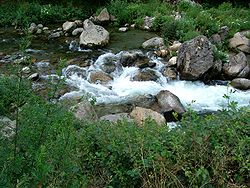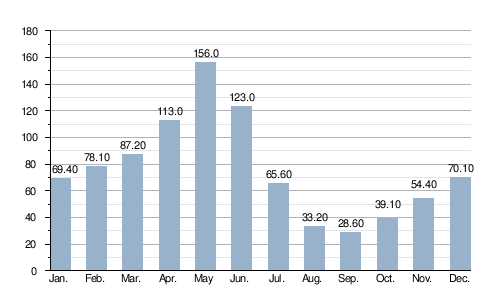Ariège (river)
The Ariège (Catalan: Arieja; Occitan: Arièja) is a river in the south of France. It is 163 kilometres (101 miles) long. It is a right tributary of the Garonne. The Ariège department is named after this river.
| Ariège | |
|---|---|
 The Ariège near Ax-les-Thermes | |
 | |
| Location | |
| Countries | |
| Physical characteristics | |
| Source | |
| - location | Pyrenees |
| - elevation | ± 2,400 m (7,900 ft) |
| Mouth | |
| - location | Garonne |
| - coordinates | 43°31′2″N 1°24′36″E / 43.51722°N 1.41000°E |
| Length | 163 km (101 mi) |
| Basin size | 3,860 km2 (1,490 sq mi) |
| Discharge | |
| - average | 65 m3/s (2,300 cu ft/s) |
| Basin features | |
| Progression | Garonne→ Atlantic Ocean |
Geography
changeThe Ariège river is 163.2 kilometres (101.4 miles) long. It has a drainage basin of 4,135 square kilometres (1,597 square miles).[1]
Its average yearly discharge (volume of water which passes through a section of the river per unit of time) is 76.4 cubic metres per second (2,700 cubic feet per second) at Pinsaguel, near the confluence with the Garonne, in the Haute-Garonne department, for a period of 30 years.[2]

Average monthly discharge (m3/s) at Pinsaguel
Course
changeThe source of the Ariège is in the Lac of Font Nègre, at the Pyrenees on the border between France and Andorra, just south of Pas de la Casa (Andorra) on the western side of the Pics Orientaux de Font Nègre, in the commune of Porta, Pyrénées-Orientales department, at an altitude of about 2,470 metres (8,104 feet).[3]
In its first part, it flows to the north, forming the border between France and Andorra, up to Pas de la Casa, and then turns to the north-east.
After flowing through the Ariège plain, the river gets out of the department of Ariège and into the department of Haute-Garonne and, finally, joins the Garonne river at Portet-sur-Garonne, near the city of Toulouse.
The Ariège flows to the northeast, in general, and passes through the following regions, departments and communes:
Andorra
France
- Occitanie region
The Ariège river flows through a total of 58 communes.[1]
Finally, it flows, as a right tributary, into the Garonne at Portet-sur-Garonne, in the Haute-Garonne department to the south of Toulouse, at 140 metres (459 feet) of altitude.[4]
Main tributaries
changeSome of the tributaries are:[1][5]
- Right tributaries:
- Oriège (21 kilometres [13 miles]); its source is on the northern side of the peak Carlit and flows into the Ariége at Ax-les-Thermes.
- Lauze (14 kilometres [8.7 miles]).
- Hers-Vif or Hers (130 kilometres [81 miles]). It is the tributary more important of the Ariége; it joins the Ariége at Cintegabelle (Haute-Garonne).
- Aïse (29 kilometres [18 miles]).
- Left tributaries
- Aston (23 kilometres [14 miles]).
- Vicdessos (36 kilometres [22 miles]). It joins the Ariége at Tarascon-sur-Ariége.
- Courbière (15 kilometres [9.3 miles]). It joins the Ariège before Tarascon-sur-Ariège.
- Arget (23 kilometres [14 miles]). It joins the Ariège on the foot of the Foix castle. Its valley is named as la Barguillière.
- Lèze (70 kilometres [43 miles]).
Gallery
change-
The Ariège near Ax-les-Thermes.
-
The Ariège river in Tarascon-sur-Ariège.
-
The Ariège in Foix.
-
The Ariège in Foix.
-
Confluence Ariège-Garonne.
Related pages
changeReferences
change- ↑ 1.0 1.1 1.2 "Fiche cours d'eau - L'Ariège (O1--0250)" (in French). SANDRE - Portail national d'accès aux référentiels sur l'eau. Archived from the original on 3 March 2016. Retrieved 1 August 2013.
- ↑ "L'Ariège à Pinsaguel [Lacroix-Falgarde]" (in French). Banque Hydro. Archived from the original on 3 March 2016. Retrieved 14 July 2017.
- ↑ "Source de l'Ariège" (in French). Géoportail. Retrieved 14 July 2017.
- ↑ "Confluence de l'Ariège" (in French). Géoportail. Retrieved 14 July 2017.
- ↑ "La rivière Ariège". ariege.over-blog.fr (in French). 2010. Retrieved 31 July 2013.
Other websites
change- Fédération de pêche de la Haute-Garonne Archived 2013-07-29 at the Wayback Machine (in French)
- Eauxvives - L'Ariége Archived 2016-06-29 at the Wayback Machine
- History and real-time water heights of Ariege river, Garonne river, and other tributaries (in French)